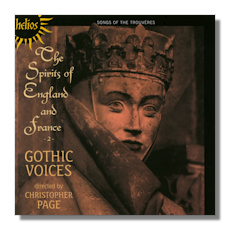
The Internet's Premier Classical Music Source
Related Links
-
De La Halle Reviews
- Latest Reviews
- More Reviews
-
By Composer
-
Collections
DVD & Blu-ray
Books
Concert Reviews
Articles/Interviews
Software
Audio
Search Amazon
Recommended Links
Site News
 CD Review
CD Review
The Spirits of England and France

Volume 2 - Songs of the Trouvères
- Anonymous (Medieval):
- Estampies I, II & III
- Donna pos vos ay chausida
- Quant voi la fleur nouvele
- Amors m'art con fuoc am flama
- Gace Brulé:
- Desconfortez, plains de dolor
- Quant define fueille et flor
- De bien amer grant joie atent
- Cil qui d'amours
- Guibert Kaukesel (fl.c.1230-1255):
- Un chant novel
- Fins cuers enamourés
- Adam de la Halle: Assenés chi, Grievilier
- Richart de Semilli (fl.1200): Je chevauchai
- Gautier de Dargies (c1165-after 1236): La doce pensée
- Audefroi le Bastart (fl.1190-1230): Au novel tens pascor
- Gontier de Soignies (d before 1220): Dolerousement comence
- Ernoul le vielle de Gastinois (fl.c.1280-1280): Por conforter mon corage
Gothic Voices/Christopher Page
Hyperion Helios CDH55282
This is a reissue of the CD originally released in 1995 as the second volume in a representative survey of French and English vocal music from about 1150 to 1450. "The Spirits of England and France, 2" contains monophonic song from the earlier half of that period, including trouvères repertoire. That's a large body of music (nearly 2,000 songs) so this (and indeed the other CDs in the series) is necessarily a sample. It concentrates on music from what is now Belgium and northern France… Picardy, Artois, Champagne.
Of the dozen and a half short songs (only one is longer than five minutes or so) six are anonymous and the remaining dozen are by eight named composers, only two of whom (Gace Brulé, c.1160-after 1213 and Adam de la Halle, 1245/50-1285/8) are otherwise widely known. Gothic Voices' then director, Christopher Page, has arranged the items for contrast as much as anything: Pastourelle follows Grand chant; Balade is implicitly compared with Estampie. What's more, the nine singers and instrumentalists of the group alternate in ever-changing combinations as the CD progresses. This leaves us in no doubt as to the richness, breadth and depth of the music for all its compact and focused intensity. It is for the most part spare, gaunt and stark. Yet never monochrome, grainy or plain.
The one common factor in performance, though, is the extent to which the musicians rise to the not inconsiderable challenges represented by totally naked exposure. This is characteristic of Gothic Voices, which has been working in this area since 1980. The performers are relatively closely-miked. Although the acoustic is appropriately resonant and adds a sense of presence, of occasion – to re-inforce the conviction that this music is special. There is nowhere to hide. Every syllable must be perfect. It is. Without being so polished that all the listener perceives is a sterile reflection. The text is paramount. While also making a virtue of the beautiful, euphonic and highly expressive blend of melody and words, the performers leave us in no doubt that the texts are what give these songs their life.
There is immense subtlety and sophistication in those texts. For all their perhaps to us somewhat stereotypical subject matter (the pains of love, exhortations to battle, travel or crusade and so on) there is an unmistakable individualism, though never a self-indulgent one, to the way the poems twist and turn; often in response to the way in which the original maker must actually have expected we would respond:
Bien sai ke çou me doit bien conforter:
Une cité, quant on velt conquester,
Si covient il pluisors assaus livrer
Ains c'om l'ait gaaignie.
Diex! ki a boine amour,
S'il s'en repent nul jour,
Il fait grant vilonie.
The achievement of Gothic Voices' members here has been to articulate that very personal communication in an almost passive way while retaining its vibrancy. Yet – by their supreme control of line and pace – in a way that represents the sentiment in the text as one which is applicable to life beyond the song. They have also sufficient command of the repertoire to be able to bring out the differences in the pieces as much as their similarities.
Interestingly, the way this set of performances has been conceived to recapture the way singers in the second half of the thirteenth century might have approached the songs: they would, it is assumed, have struck a balance between veneration for the traditions in which they were working and performing on the one hand; and the liberty conferred on their delivery by possession of, or access to, the written texts of the trouvère songs on the other. The protocols elaborated as a result of this approach determined which items were presented unaccompanied, and which with instruments – and what those instruments were. Other decisions had to be taken, concerning length and repeated elements within songs. Both empirically and from a musicologically tenable perspective these decisions work. This is a collection of moving and accessible music performed with great style and conviction. It can be recommended for anyone who missed it 15 years ago; and for those who want to explore the repertoire further – or indeed find out why this music has such a strong following.
With the CD comes a booklet of the usual high standard – although the print is a little small and hard to read, so much information (including all the texts, in French and English) is there in even a couple of dozen pages.
Copyright © 2009, Mark Sealey





















